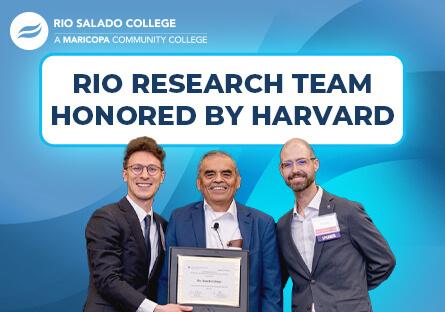This article appears for archival purposes. Any events, programs and/or initiatives mentioned may no longer be applicable.

The RioPACT Tool: A Story of Recognition and Progress
A tool designed by a Rio Salado research team to predict student persistence in order to provide early intervention received national attention this spring from The Strategic Data Project, at Harvard University’s Center for Education Policy Research.
Three years ago, Rio Salado College faced a common higher education challenge of ensuring student success outcomes. With declining enrollments, limited funding, and increased pressure to demonstrate positive student outcomes, Rio recognized the urgency of implementing cost-effective solutions to maximize strategic enrollment initiatives.
To address this issue, Dr. Fermin Ornelas, senior research analyst, proposed a groundbreaking project. Along with Zach Lewis, Rio’s associate dean, their mission was to develop an in-house predictive analytics model that would help improve student success outcomes at the college.
Knowing which students may struggle based on the predictions, they believed, could provide advisors and instructors insight into where to put their time and attention in order to encourage students to stay the course and continue in their studies, eventually leading to degree or certification completion. The result was the RioPACT (Persistence and Completion Tracking) model. This predictive model analyzes three areas to determine the likelihood a student will persist and continue classes in future semesters:
-
Student engagement levels (such as how often they engage with the coursework),
-
Previous academic success (such as prior experience in college), and
-
Demographic characteristics (such as whether or not they are a first-gen student).
After initial development, Fermin, Lewis, and their team tirelessly developed and tested the machine learning model that formed the backbone of RioPACT during the 2021-22 academic year. The early results were promising, with a prediction accuracy rate of nearly 75%. Encouraged by these findings, the team started implementing the RioPACT model as a pilot project in collaboration with two key student support teams at Rio: the Office of Academic Advisement and the Office of Disability Resources and Services.
It also garnered national attention, earning second place among national finalists at The Strategic Data Project Convening last month. The Strategic Data Project maintains a strong presence within the K-12 community, Lewis said. But there’s much that higher education can learn and contribute.
“This was our first touchpoint with this group and now, moving forward, hopefully we’ll be able to encourage more conversations about how colleges and universities can benefit from interacting with this organization,” Lewis said.
The impact of RioPACT is becoming increasingly evident. The research team aims to better incorporate the data into workflows for advising, with plans to evaluate those outcomes in Fall 2023. The objective is to integrate it into the college's student information systems for wider adoption
“From that we hope to understand what are the factors that ultimately lead to the student being judged by the platform (RioPACT) as successfully persisting and what can we do to influence student behavior across the finish line,” Lewis said.
The Harvard recognition not only validated their hard work but also opened new doors for further development and collaboration. Ornelas and Lewis are now invited to take part in a fellowship with the institution.
As fellows, they will be tasked with formulating dedicated research questions, with a specific focus on Career and Technical Education (CTE) outcomes.
“The fellowship is more to have a feedback process with some of the things we are doing,” Ornelas said. “It could be if there are difficulties or theoretical difficulties they could serve as a forum to address some of those. We know Harvard is a top university.”
Since Rio Salado College offers numerous programs falling under the Career and Technical Education (CTE) umbrella, the research questions will aim to identify the factors that contribute to successful online CTE students. The ultimate objective is to gain a deeper understanding of student behavior and find ways to influence and support them to successfully complete their education.
“My ideal outcome would be to develop these applications that will really help advisors and maybe even instructors,” Ornelas said.